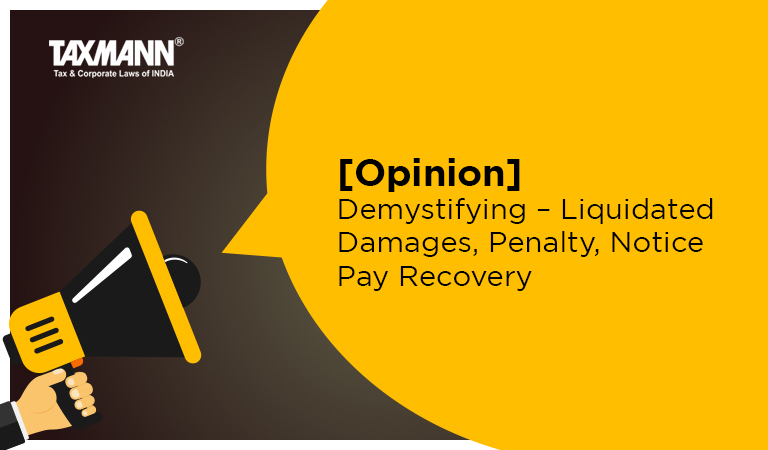[Opinion] Demystifying – Liquidated Damages, Penalty, Notice Pay Recovery
- News|Blog|GST & Customs|
- 3 Min Read
- By Taxmann
- |
- Last Updated on 17 August, 2022

Gulzar Didwania & Anubhav Jain – [2022] 141 taxmann.com 232 (Article)
The taxability of liquidated damages, penalty, notice pay recovery has been largely debated since inception of the negative list regime under service tax with numerous litigations around the subject in the erstwhile service tax regime and the GST regime. Recently, the Government has issued a circular (no. 178/10/2022-GST) explaining various facets to determine the taxability. In order to analyze the ramifications of the circular, let us first understand the meaning or applicability of the following terms:
-
- Liquidated damages (LD): Damages which an injured party is entitled to collect on account of specific breach or non-fulfillment of conditions. These are typically ascertained at the time of forming the contract.
- Penalty: Penalty is typically imposed for breaking a law or a contract. Generally, the nomenclature “penalty” is used in relation to violation of laws. Further, there is no agreement that the violator would be allowed or permitted to do an act against payment of penalty.
- Notice Pay recovery: Notice pay recovery is made by an employer from an employee in case where the employee is leaving employment before the minimum agreed period, as stated in the employment contract.
Why taxability of these items is under question?
Section 7 of CGST Act states the scope of supply. Further, Section 7(1A) of CGST Act specifies certain activities or transactions to be treated either as supply of goods or supply of services in Schedule II. Clause 5(e) to Schedule II mentions that “agreeing to the obligation to refrain from an act, or to tolerate an act or a situation, or to do an act shall be treated as supply of services”. The same clause was identical to the declared service stated under Section 66E(e) in the erstwhile service tax regime as well. Now, with inclusion of the above, the moot question is whether the transaction which is in the nature of liquidated damages, penalty or notice pay recovery, is subject to GST or not.
Judgements/Rulings around this issue
Various judgements/rulings around liquidated damages
-
- Various Advance Rulings upheld that the payment of liquidated damages for breach of contract is taxable under Clause 5(e) of Schedule II of CGST Act
– Bajaj Finance Ltd., In re [2019] 108 taxmann.com1/[2020] 77 GST 119 (AAAR-Maharashtra)
– Maharashtra State Power Generation Co. Ltd., In re [2018] 97 taxmann.com 408/70 GST 411 (AAAR-Maharashtra)
– Rashtriya Ispat Nigam Ltd, In re [2019] 112 taxmann.com 5 (AAR-Andhra Pradesh)
-
- Judgments in the erstwhile Service tax regime wherein CESTAT held that Section 66E (e) of Finance Act, 1994 (identical to Clause 5(e) to Schedule II) not be applicable to cases for payment of liquidated damages for breach of contract
– Amit Metalinks Lts v. Commissioner of Central Goods & Service Tax [2011] 127 taxmann.com 248 (Kol. – CESTAT)
– Vikhroli Corporate Park v. CST [2017] 78 taxmann.com 12/59 GST 455 (mum. – CESTAT)
– KN Foods Industries (P.) Ltd. v. Commissioner of CGST & Central Excise [2020] 38 GSTL 60 (Trib. – All.)
-
- European Union Judgements (EU) VAT contains provisions which are identical to Clause 5(e) of Schedule II stating the provisions do not apply to liquidated damages received under the contract
– Societe Thermale d Eugine-les-Bains v. Minister de Economie, des Finance set de I’ Industries [2010] BVC 367
– Lloyds Bank Plc v. Carrick & Carrick [1996] BVC 2875
Click Here To Read The Full Article
Disclaimer: The content/information published on the website is only for general information of the user and shall not be construed as legal advice. While the Taxmann has exercised reasonable efforts to ensure the veracity of information/content published, Taxmann shall be under no liability in any manner whatsoever for incorrect information, if any.

Taxmann Publications has a dedicated in-house Research & Editorial Team. This team consists of a team of Chartered Accountants, Company Secretaries, and Lawyers. This team works under the guidance and supervision of editor-in-chief Mr Rakesh Bhargava.
The Research and Editorial Team is responsible for developing reliable and accurate content for the readers. The team follows the six-sigma approach to achieve the benchmark of zero error in its publications and research platforms. The team ensures that the following publication guidelines are thoroughly followed while developing the content:
- The statutory material is obtained only from the authorized and reliable sources
- All the latest developments in the judicial and legislative fields are covered
- Prepare the analytical write-ups on current, controversial, and important issues to help the readers to understand the concept and its implications
- Every content published by Taxmann is complete, accurate and lucid
- All evidence-based statements are supported with proper reference to Section, Circular No., Notification No. or citations
- The golden rules of grammar, style and consistency are thoroughly followed
- Font and size that’s easy to read and remain consistent across all imprint and digital publications are applied



 CA | CS | CMA
CA | CS | CMA
